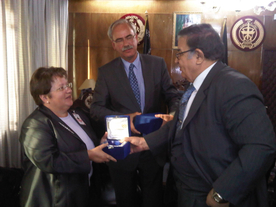Marking International Anti-Corruption Day
The United Nations General Assembly designated 9 December as International Anti-Corruption Day, when it adopted the UN Convention against Corruption in October 2003. The aim is to raise awareness of corruption and its impact on society, and to mobilize governments to tackle this threat to economic development, democracy and stability. NATO is playing its part to reduce the risk of corruption in the defence establishments of Allies and partners through the Building Integrity Initiative.

“Corruption undermines democracies and the rule of law. It has a corrosive effect on development and security,” says Ambassador Dirk Brengelmann, NATO Assistant Secretary General for Political Affairs and Security Policy. “In the security sector, corruption wastes public resources and reduces the effectiveness of forces and operational capabilities. NATO remains committed to developing security institutions and structures that are transparent and accountable.”
Now in its fourth year, the Building Integrity Initiative has developed a range of practical tools to support individual countries’ efforts to enhance transparency, accountability and integrity in the defence sector. Meeting earlier this week, NATO foreign ministers endorsed a progress report on the initiative’s ongoing efforts, which include a tailored programme for Afghanistan.
The initiative is supported by a Trust Fund led by Norway, Poland, Switzerland and the United Kingdom.
Afghanistan: a priority

NATO Ambassador for Building Integrity Jan-Lucas Van Hoorn meets Afghan Defence Minister Abdul Rahim Wardak in Kabul in September 2011
“Fighting against corruption is a crucial part of the transition we are engaging now in Afghanistan,” says General Stephane Abrial, NATO’s Supreme Allied Commander Transformation. “It is also the reason we devote so much effort in training people in this field of building integrity and anti-corruption.”
The tailored programme includes a proposal to establish a Building Integrity Centre as part of the Afghan National Security University. The centre will support the Afghan National Security Forces in developing expertise and supporting a sustained effort, providing practical measures to reduce the risk of corruption in the security sector.
The Building Integrity Tool Kit
Established by the Euro-Atlantic Partnership Council in November 2007, the Building Integrity Initiative seeks to raise awareness and promote good practice. It provides practical tools to help nations build integrity and reduce risks of corruption in the security sector by strengthening transparency and accountability.
The Building Integrity Tool Kit offers education and training activities, a pool of subject-matter experts to strengthen procedures and practices in areas such as management of financial and personnel resources, and a handbook to promote good practice. Work is ongoing to develop further tools.
The tool kit and programme of activities are open to all Allies and NATO’s partners in the Euro-Atlantic area, the Mediterranean and the Gulf region, as well as other partners across the globe. Participation is on a voluntary basis.
Ongoing efforts
To date, six nations – Afghanistan, Bosnia and Herzegovina, Bulgaria, Croatia, Norway and Ukraine – have completed the Self Assessment and Peer Review. Action plans have been developed for Afghanistan, southeastern Europe and Ukraine.
Training teams have been established and over 500 civil servants, military officers and representatives of civil society have taken part in Building Integrity training and education activities conducted in Europe and Afghanistan.
National pre-deployment preparations now also include elements to better understand corruption as a security risk and practical measures to reduce the risk of corruption and building integrity.
A progress report on efforts to mainstream and further develop the Building Integrity Initiative will be presented to Allied leaders, when they meet in Chicago for the next NATO summit in May 2012.
